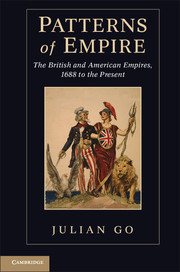Book contents
- Frontmatter
- Contents
- Preface and Acknowledgments
- List of Tables
- List of Figures
- Introduction
- 1 Imperial Paths to Power, 1688–1939
- 2 Colonial Rules
- 3 Hegemonies and Empires
- 4 Imperial Forms, Global Fields
- 5 Weary Titans
- 6 The Dynamics of Imperialism
- 7 Conclusion
- Appendix Notes on Data
- Archives and Abbreviations
- References
- Index
Preface and Acknowledgments
Published online by Cambridge University Press: 05 June 2012
- Frontmatter
- Contents
- Preface and Acknowledgments
- List of Tables
- List of Figures
- Introduction
- 1 Imperial Paths to Power, 1688–1939
- 2 Colonial Rules
- 3 Hegemonies and Empires
- 4 Imperial Forms, Global Fields
- 5 Weary Titans
- 6 The Dynamics of Imperialism
- 7 Conclusion
- Appendix Notes on Data
- Archives and Abbreviations
- References
- Index
Summary
This book is about the American and the British empires. In the tradition of macro-comparative historical sociology, it puts the two empires under a critical comparative lens. But this book is also meant as an assault. It is an assault against a way of thinking called “exceptionalism.” Exceptionalism presumes that the United States is special and especially benign. It assumes that the United States has a unique and essential character. It assumes that the United States exemplifies the most perfect liberal democracy in the world. It assumes that understanding what the United States does abroad only depends on understanding what happens within the United States. It also assumes that the United States and its people are the sole agents of history – whether for ill or for good.
Exceptionalism is the North American counterpart to Eurocentrism. It silently structures thought. And it has helped to create and sustain empire. It does this not only by heralding the American empire as unique, but also by assuming the United States and its people have the privilege of directing history. Any analysis of the American empire must therefore confront exceptionalist thought.
- Type
- Chapter
- Information
- Patterns of EmpireThe British and American Empires, 1688 to the Present, pp. ix - xiiPublisher: Cambridge University PressPrint publication year: 2011



